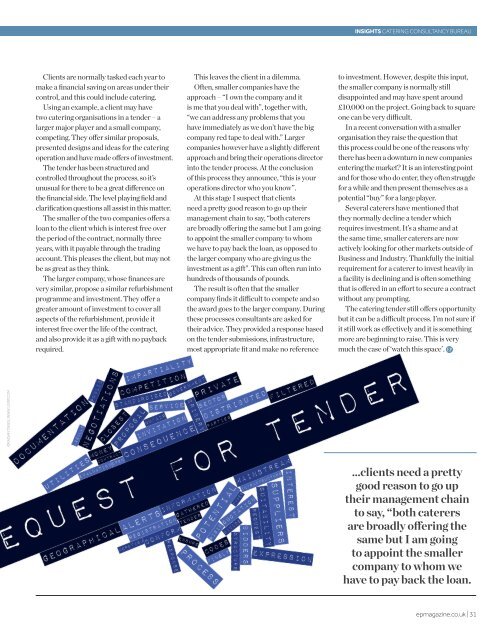EP Insights & Action
Expert observers comment on the Industry. This magazine is designed to bring together the thought leadership, ideas and opinions of leading consultants and operators from across the industry. EP's vision is to create an open narrative and debate that explains the perspective and thinking on the market and Industry. It will help all progress, so let us know your thoughts, subscribe and be involved.
Expert observers comment on the Industry. This magazine is designed to bring together the thought leadership, ideas and opinions of leading consultants and operators from across the industry. EP's vision is to create an open narrative and debate that explains the perspective and thinking on the market and Industry. It will help all progress, so let us know your thoughts, subscribe and be involved.
You also want an ePaper? Increase the reach of your titles
YUMPU automatically turns print PDFs into web optimized ePapers that Google loves.
INSIGHTS CATERING CONSULTANCY BUREAU<br />
Clients are normally tasked each year to<br />
make a financial saving on areas under their<br />
control, and this could include catering.<br />
Using an example, a client may have<br />
two catering organisations in a tender – a<br />
larger major player and a small company,<br />
competing. They offer similar proposals,<br />
presented designs and ideas for the catering<br />
operation and have made offers of investment.<br />
The tender has been structured and<br />
controlled throughout the process, so it’s<br />
unusual for there to be a great difference on<br />
the financial side. The level playing field and<br />
clarification questions all assist in this matter.<br />
The smaller of the two companies offers a<br />
loan to the client which is interest free over<br />
the period of the contract, normally three<br />
years, with it payable through the trading<br />
account. This pleases the client, but may not<br />
be as great as they think.<br />
The larger company, whose finances are<br />
very similar, propose a similar refurbishment<br />
programme and investment. They offer a<br />
greater amount of investment to cover all<br />
aspects of the refurbishment, provide it<br />
interest free over the life of the contract,<br />
and also provide it as a gift with no payback<br />
required.<br />
This leaves the client in a dilemma.<br />
Often, smaller companies have the<br />
approach – “I own the company and it<br />
is me that you deal with”, together with,<br />
“we can address any problems that you<br />
have immediately as we don’t have the big<br />
company red tape to deal with.” Larger<br />
companies however have a slightly different<br />
approach and bring their operations director<br />
into the tender process. At the conclusion<br />
of this process they announce, “this is your<br />
operations director who you know”.<br />
At this stage I suspect that clients<br />
need a pretty good reason to go up their<br />
management chain to say, “both caterers<br />
are broadly offering the same but I am going<br />
to appoint the smaller company to whom<br />
we have to pay back the loan, as opposed to<br />
the larger company who are giving us the<br />
investment as a gift”. This can often run into<br />
hundreds of thousands of pounds.<br />
The result is often that the smaller<br />
company finds it difficult to compete and so<br />
the award goes to the larger company. During<br />
these processes consultants are asked for<br />
their advice. They provided a response based<br />
on the tender submissions, infrastructure,<br />
most appropriate fit and make no reference<br />
to investment. However, despite this input,<br />
the smaller company is normally still<br />
disappointed and may have spent around<br />
£10,000 on the project. Going back to square<br />
one can be very difficult.<br />
In a recent conversation with a smaller<br />
organisation they raise the question that<br />
this process could be one of the reasons why<br />
there has been a downturn in new companies<br />
entering the market? It is an interesting point<br />
and for those who do enter, they often struggle<br />
for a while and then present themselves as a<br />
potential “buy” for a large player.<br />
Several caterers have mentioned that<br />
they normally decline a tender which<br />
requires investment. It’s a shame and at<br />
the same time, smaller caterers are now<br />
actively looking for other markets outside of<br />
Business and Industry. Thankfully the initial<br />
requirement for a caterer to invest heavily in<br />
a facility is declining and is often something<br />
that is offered in an effort to secure a contract<br />
without any prompting.<br />
The catering tender still offers opportunity<br />
but it can be a difficult process. I’m not sure if<br />
it still work as effectively and it is something<br />
more are beginning to raise. This is very<br />
much the case of ‘watch this space’.<br />
©RADIANTSKIES | WWW.123RF.COM<br />
...clients need a pretty<br />
good reason to go up<br />
their management chain<br />
to say, “both caterers<br />
are broadly offering the<br />
same but I am going<br />
to appoint the smaller<br />
company to whom we<br />
have to pay back the loan.<br />
epmagazine.co.uk | 31
















